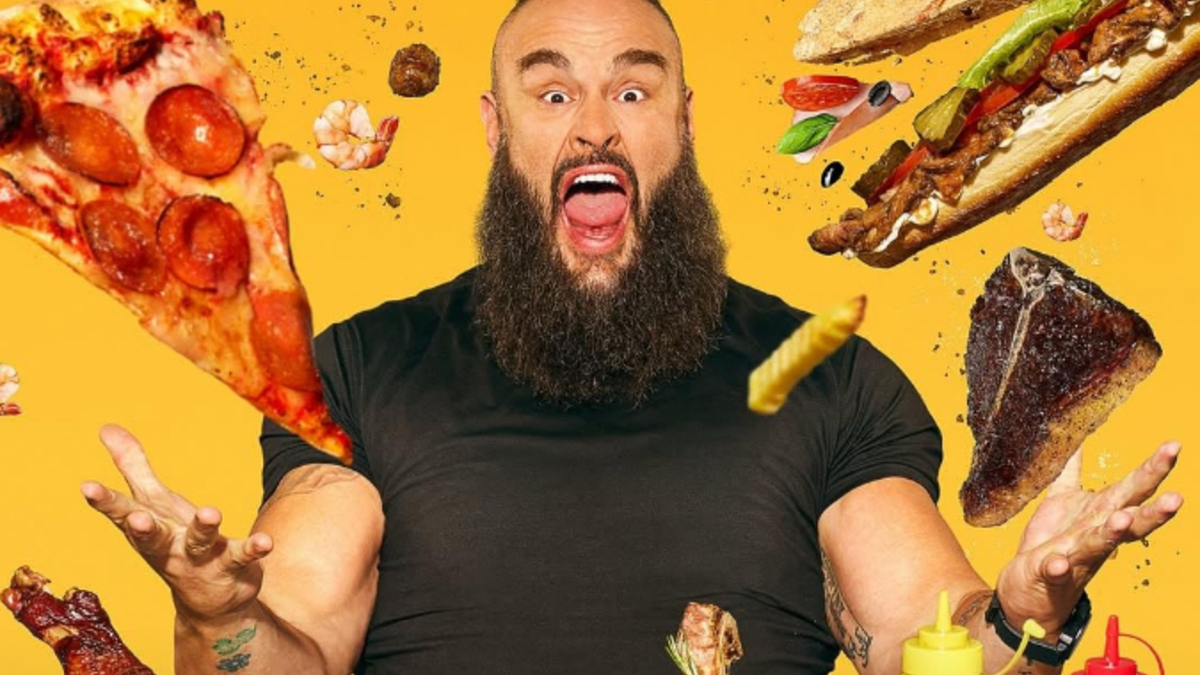“First of all, let me introduce myself. What you see sittin’ before you is not a figment of your imagination. I’m comin’ to you live and in beautiful living colour, causing excitement all across the nation. Now for some folks, I don’t need any introduction. But for those of you who don’t know, they call me Brickhouse Brown — master of seduction.”

Along with being the self-proclaimed master of seduction, Brown could be considered the master of shoot interviews, as he knocks down the walls sharing tell-all stories of drugs and orgies in a new DVD from Highspots’ shoot interview series.
Brown is one of a kind, to say the least. From his rocky start in the Southwest to his short stay in the Mid-Atlantic, then to his volatile time with Bill Watts in the Mid-South, Brown leaves no stone left unturned in this highly entertaining, profanity-filled double-disc set.
Articulate, insightful and real, Brown discusses his childhood watching Championship Wrestling from Florida on Saturday nights, and being a big fan of Terry Funk. When asked how he got into the wrestling business, Brown isn’t joking when he says, “Nobody in pro wrestling has gotten into pro wrestling the way I did. It had never been done (like that) before, and hasn’t ever been done since.” The story that unfolds is hysterical as Brown delivers the goods on his ill-fated first match, and the hard lessons learned.
Throughout the shoot, there’s a running theme of ethnicity as Brown sheds light on some the challenges he faced being a black wrestler in the ’80s, working multiple territories from Florida to Memphis. At some points in his career he was the only black wrestler on a roster, while in other territories the opposite was true. “(In Memphis), I showed up and there were 12 black guys and I’m thinkin’ what the f*** am I gonna do here? It looks like they’re making a Tarzan movie. Guys like Pork Chop Cash, Bad Leroy Brown and Ray Candy — they were all there, and havin’ 12 black guys in one territory was unheard of.”
Before arriving in Tennessee, Brown pitched the idea of a tag team to Jerry Lawler called the PYT (Pretty Young Things) Express, where both wrestlers would dress like Michael Jackson. But when Brown got there, the gimmick had already been given to two other black wrestlers. “I walked into Tennessee and what do I see, Koko B. Ware in a red jacket and glitter glove.” It was from this point on in the interview, Brown shares one entertaining story after another he had working for Lawler.
A true journeyman, Brown worked anywhere and everywhere wrestling as both a face and heel, in tag teams like Soul Patrol, and The Breakers (inspired by the break dancing craze of the early ’80s), and singles competition working with Dusty Rhodes and Kevin Sullivan in Florida.
Brown tells the story of the Junkyard Dog getting a briefcase full of money from Vince McMahon, guaranteed if he walks out on Watts in Mid-South with no notice. In another candid tale, Brown shares his tumultuous relationship with Ernie Ladd, who once told him, “You’ve got to be the most boring, lifeless, colourless black man I ever seen in my life — you ain’t got no motherf*****’ rhythm.” With a degree in communication, Brown was told by Ladd he should give up wrestling because, “You ain’t gonna make it.”
But Brown persevered, and later came to respect Ladd who befriended him, and “became like a father figure.” Brown tells the story of how Ladd once beat up both Jack and Jerry Brisco in a parking lot with a crowbar, then drove them to the hospital and dumped them at the entrance.
Along with Ladd, Brown shares stories of working for Watts, and the respect he had for “the real shoot promoter” who was tough but fair. “It didn’t matter if you were white, black or blue, Watts would spit in your face like big papa bear — and I loved it.” In another funny tale, Brown talks about being fired from the Mid-South and heading to the Mid-Atlantic to wrestle for Ole Anderson. After wrestling his first match on television for Mid-Atlantic and losing to Kareem Muhammad (Ray Candy), Brown recounts the hilarious story of an irate Watts calling him up to tell him to get back to the Mid-South. “You stupid mother f*****!” Brown recalls Watts screaming through the phone. “Tell Ole to give you your money and to ‘suck my d***!'”
From there, Brown takes us back to Tennessee working for Lawler, and the time he was interviewed by the local news station about Lawler’s troubles with the law. “Jerry got into trouble dealin’ with young girls,” says Brown. He then explicitly shares what he said on camera, and candidly spoke about being a father himself, and what he would do if anyone touched his daughters.
“I ain’t sure why nobody ever whooped Jerry’s ass,” said Brown, then, in a strange segue he breaks into a promo, “I’m good when I got a partner, but I’m great when I go at it alone. I’m the baddest mambo jambo in the business, when it comes to spinnin’ on the microphone.” And Brown believes it, as he names only a few current WWE wrestlers who are on his level: “Ain’t too many who can out talk me even today,” boasts Brown. “The only man who could go tit for tat with me was Iceman Parsons, we were on an even keel, and we could call each other n******.”
And it’s from this point on, when the interviewer asks Brown to dish out some dirt that the interview really picks up with graphic stories of sex and drugs, starting with Miss Jackie in the USWA. “You must know how to boost sales on these motherf*****’ DVDs,” Brown says to the interviewer. “We try,” the interviewer replies off camera as Brown sips on a Budweiser and lights up a cigarette.
From Matt Borne and Eric Embry to Buddy Landell and Barry Darsow, no one is left out as Brown spills the beans about another wrestler’s alleged rape, wild sexual escapades, and his introduction to cocaine. And though his father was “a bona fide pimp,” Brown credits Jimmy Valiant, Ric Flair, Gary Hart and referee Tommy Young for his introduction to smoking weed, on a long car ride through the Mid-Atlantic.
When on the topic of World Class Championship Wrestling in Texas, Brown unleashes outlandish tales about everyone from the Von Erichs to the Missing Link and Gino Hernandez. “If I’m gonna tell shit about others, I have to tell it on myself,” says Brown, who was a drug dealer to all the stars of World Class. It’s in this riveting segment, Brown speaks of his biggest customers, some of which bought $400 worth of drugs a night. “Drugs were so prevalent,” says Brown. “World Class had its own aura, when you watched it on TV, you could tell it was different to Memphis and other territories. I don’t know if it was because we were all so f*****’ high!”
Drugs, sex, and violence are recurring themes as Brown’s monologue meanders from territory to territory, to a brief stint in the WWF, and over to Puerto Rico and Japan. “Bruiser Brody and Stan Hansen would beat your f*****’ ass,” said Brown, recalling wrestling them both around the globe. In one of the most explicit and graphic recollections of the murder of Brody in a Puerto Rican locker room, Brown states Brody would be alive today had he not been a bully. “He would beat the f*** out of a guy in the ring, and that’s what he did to the guy (who stabbed him to death). Brody could have been saved, but all the guys who watched him bleed to death in the shower — guess what, he beat all their f*****’ asses. That’s what happens to bullies, and they let him die in that stinkin’ shower in Puerto Rico.”
From there, Brown shares insight on the racial discrimination lawsuit in WCW, and varying effects it had on all the black wrestlers from Ice Train to Booker T. “Tony Atlas was supposed to be the first black (World) champion in the WWF,” says Brown, who tells a story of Atlas’ behaviour that resulted in that championship reign never happening.
“Working on top, you have to be selfish,” Brown states referring to fellow black wrestlers who have achieved great success and world championships. At a recent WWE house show, Brown walked backstage hoping to talk to those at the top and score a job. “Triple H after his match gave me 20 minutes of his time and said, ‘Man, Brickhouse, you look good,'” said Brown, who inquired about opportunities in the WWE. “(Triple H) said ‘Vince didn’t want to put no money into a guy what can’t give him 10 years,'” says Brown, who was then advised to consider a referee position, making $80,000 a year. Brown then goes on to talk about his referee try-out with the WWE at a show in Nashville, and his frustrating dealings with Joe Laurenitis and others backstage.
As the interview winds down, Brown once again revisits the topics of sex and drugs as he shares explicit stories of Sweet Brown Sugar, Downtown Bruno, and Jeff Jarrett. “I got Jeff Jarrett his first black piece of p**** — I laid it out for him,” Brown laughs. “And he’s been sprung ever since.”
In one last story, Brown tells a jaw-dropping tale of one wrestling personality renowned for “his ethnic jokes.” Brown chuckles as he revisits the time he took things to the extreme and had everyone on their stomachs face down in the locker room: “So I pulled out my gun and said, ‘Alright, that’s it goddammit. I’m tired of these f****** n***** jokes!'”
But Brown claims he’s only touched the surface, as another shoot DVD with Highspots is in the works, along with an autobiography that will have, “both an adult version and a kiddie version.” He says he’s got plenty more dirt to dish about some of the biggest names in the business. “This,” he promises at the end of the three-hour shoot interview, “(was) just a sample!“




